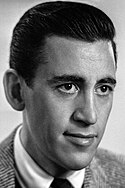J.D. Salinger Quote
When the weather's nice, my parents go out quite frequently and stick a bunch of flowers on old Allie's grave. I went with them a couple of times, but I cut it out. In the first place, I don't enjoy seeing him in that crazy cemetery. Surrounded by dead guys and tombstones and all. It wasn't too bad when the sun was out, but twice—twice—we were there when it started to rain. It was awful. It rained on his lousy tombstone, and it rained on the grass on his stomach. It rained all over the place. All the visitors that were visiting the cemetery started running like hell over to their cars. That's what nearly drove me crazy. All the visitors could get in their cars and turn on their radios and all and then go someplace nice for dinner—everybody except Allie. I couldn't stand it. I know it's only his body and all that's in the cemetery, and his soul's in Heaven and all that crap, but I couldn't stand it anyway. I just wished he wasn't there.
When the weather's nice, my parents go out quite frequently and stick a bunch of flowers on old Allie's grave. I went with them a couple of times, but I cut it out. In the first place, I don't enjoy seeing him in that crazy cemetery. Surrounded by dead guys and tombstones and all. It wasn't too bad when the sun was out, but twice—twice—we were there when it started to rain. It was awful. It rained on his lousy tombstone, and it rained on the grass on his stomach. It rained all over the place. All the visitors that were visiting the cemetery started running like hell over to their cars. That's what nearly drove me crazy. All the visitors could get in their cars and turn on their radios and all and then go someplace nice for dinner—everybody except Allie. I couldn't stand it. I know it's only his body and all that's in the cemetery, and his soul's in Heaven and all that crap, but I couldn't stand it anyway. I just wished he wasn't there.
Related Quotes
About J.D. Salinger
The Catcher in the Rye (1951) was an immediate popular success; Salinger's depiction of adolescent alienation and loss of innocence was influential, especially among adolescent readers. The novel was widely read and controversial, and its success led to public attention and scrutiny. Salinger became reclusive, publishing less frequently. He followed Catcher with a short story collection, Nine Stories (1953); Franny and Zooey (1961), a volume containing a novella and a short story; and a volume containing two novellas, Raise High the Roof Beam, Carpenters and Seymour: An Introduction (1963). Salinger's last published work, the novella Hapworth 16, 1924, appeared in The New Yorker on June 19, 1965.
Afterward, Salinger struggled with unwanted attention, including a legal battle in the 1980s with biographer Ian Hamilton and the release in the late 1990s of memoirs written by two people close to him: Joyce Maynard, an ex-lover; and his daughter, Margaret Salinger.
